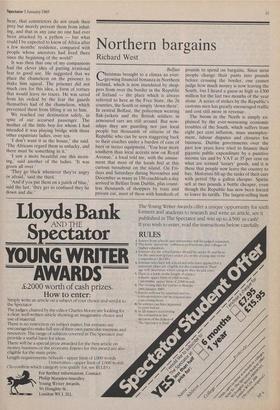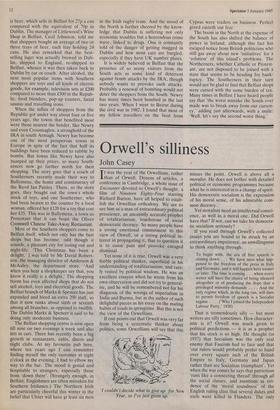Northern bargains
Richard West
Christmas brought to a climax an ever- growing financial bonanza in Northern Ireland, which is now inundated by shop- pers from over the border in the Republic of Ireland — the place which is always referred to here as the Free State, the 26 counties, the South or simply 'down there'. In central Belfast, the policemen wearing flak-jackets and the British soldiers in armoured cars are still around. But now- adays they are guarding not just local people but thousands of citizens of the Republic who can be seen staggering back to their coaches under a burden of cans of beer or stereo equipment. 'You hear more southern than local accents now on Royal Avenue,' a local told me, with the amuse- ment that most of the locals feel at this curious turnabout on the island. On Fri- days and Saturdays during November and December as many as 130 coachloads a day arrived in Belfast from Dublin, plus count- less thousands of shoppers by train and private car, most of them with hundreds of
pounds to spend on bargains. Since most people change their punts into pounds before crossing the border, one cannot judge how much money is now leaving the South, but I heard a guess as high as £300 million for the last two months of the year alone. A series of strikes by the Republic's customs men has greatly encouraged traffic • and cost still more in revenue.
The boom in the North is simply ex- plained by the ever-worsening economic troubles of the South, which suffers from eight per cent inflation, mass unemploy- ment, labour disputes and closures for business. Dublin governments over the past few years have tried to finance their gigantic public expenditure by a punitive income tax and by VAT at 35 per cent on what are termed 'luxury' goods, and it is these that people now leave the country to buy. Motorists fill up the tanks of their cars with petrol 58p a gallon cheaper. Spirits sell at two pounds a bottle cheaper, even though the Republic has now been forced to lower its tariffs. The largest-selling item is beer, which sells in Belfast for 27p a can compared with the equivalent of 70p in Dublin. The manager of Littlewood's Wine Shop in Belfast, Cecil Johnston, told me that shoppers bought an average of two or three trays of beer, each tray holding 24 cans. He also remarked that the best- selling lager was actually brewed in Dub- lin, shipped to England, re-shipped to Belfast, whence it was then taken back to Dublin by car or coach. After alcohol, the next most popular items with Southern shoppers are toys and all kinds of electric goods, for example, television sets at £200 compared to more than £300 in the Repub- lic, food blenders, pop-up toasters, facial saunas and travelling irons.
When the influx of shoppers from the Republic got under way about four or five years ago, the towns that benefited most were those nearest the border, like Newry and even Crossmaglen, a stronghold of the IRA in south Armagh. Newry has become one of the most prosperous towns in Europe in spite of the fact that half its buildings have been reduced to rubble by bombs. But towns like Newry have also bumped up their prices, so many South- erners now go farther north for their shopping. The story goes that a coach of Southerners recently made their way to Ballymena, the home and constituency of the Revd Ian Paisley. There, so the story goes, they bought out the town's whole stock of toys, and one Southerner, who had been beaten to the counter by a local woman, offered her £120 for a toy that cost her £35. This was in Ballymena, a town so Protestant that it can boast the Oliver Cromwell Chinese Take-Away Restaurant.
Most of the Southern shoppers come to Belfast itself, which not only has the best shops but has become, odd though it sounds, a pleasant city for eating out and night-life. 'This Christmas has been a delight,' I was told by Mr David Robert- son, the managing director of Anderson & McAuley, the department store. 'And when you hear a shopkeeper say that, you know it really is a delight.' The shopping boom has even affected shops that do not sell alcohol, toys and electrical goods. The Belfast branch of Marks & Spencer has just expanded and hired an extra 200 staff, so that it now ranks about sixth or seventh among all branches, as opposed to twelfth. The Dublin Marks & Spencer is said to be doing only moderate business.
The Belfast shopping centre is now open till nine on two evenings a week and also lets in cars. There has recently been a big growth in restaurants, cafés, discos and night clubs. At my favourite pub here, where ten years ago I can remember finding myself the only customer at eight o'clock in the evening, I had to elbow my way to the bar. The mood is genial and hospitable to strangers, especially those from 'down there'. (Strangely enough, in Belfast, Englishmen are often mistaken for Southern Irishmen.) The Northern Irish are particularly cheerful this winter in the belief that Ulster will have at least six men in the Irish rugby team. And the mood of the North is further cheered by the know- ledge that Dublin is suffering not only economic troubles but a horrendous crime wave, linked to drugs. One is constantly told of the danger of getting mugged in Dublin and how most cars are burgled, especially if they have UK number plates.
It is widely believed in Belfast that the presence of so many visitors from the South acts as some kind of deterrent against bomb attacks by the IRA, though nobody wants to provoke such attacks. Probably a renewal of bombing would not deter the shoppers from the South. Newry has many times been bombed in the last two years. When I went to Beirut during the civil war in 1982, I found that most of my fellow travellers on the boat from Cyprus were traders on business. Perfect greed casteth out fear.
The boom in the North at the expense of the South has also shifted the balance of power in Ireland, although this fact has escaped notice from British politicians who still gas away about new 'initiatives' for a 'solution' of this island's problems. The Northerners, whether Catholic or Protest- ant, are not disposed to be joined with a state that seems to be heading for bank- ruptcy. The Southerners in their turn would not be glad to find that Belfast shops were cursed with the same burden of tax. Many times in Belfast I have heard people say that 'the worst mistake the South ever made was to break away from our curren- cy,' adding just afterwards, with a smile: 'Well, let's say the second worst thing.'







































 Previous page
Previous page